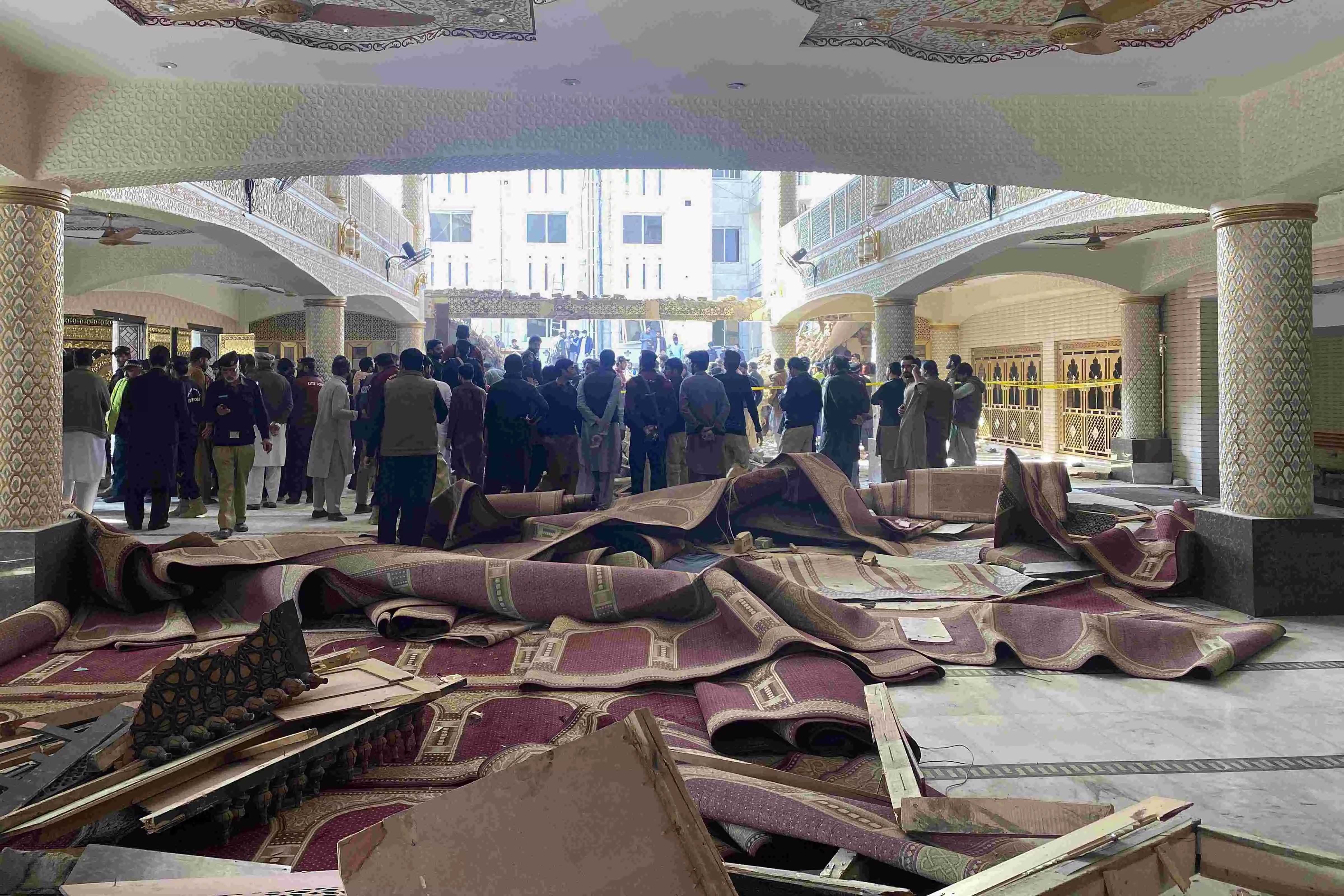In despair
Pakistan is ostensibly in a state of shock and desperation after the TTP-sponsored Peshawar suicide bombing rattled its already beleaguered economy

Pakistan, with a beleaguered economy and no immediate sign of a bailout, is struggling to cope with indicating of rising terror as evident in a spate of attacks, the most recent being the Peshawar suicide bombing claiming more than 100 lives in the Police Lines complex on January 30. While the blame game is still on as to who is responsible for this deadly assault in a Mosque inside the most fortified complex of Peshawar Police Lines, the consensus now emerges as Tehreek-e-Taliban Pakistan (TTP) behind the attack rattling the Pakistani security establishment which is already troubled with multiple security challenges.
Preliminary investigations reveal that the suicide bomber, disguised as a policeman, hoodwinked the security entrance of the Peshawar Police Lines, stood in the first line of worshippers and blew himself up in smithereens. This incident dealt a severe blow to Pakistan and portrayed:
❋ The dismal state of intelligence prevailing in the Pakistani security agencies;
❋ Complete lack of coordination between the various security and intelligence outfits in Khyber Pakhtunkhwa (KP) province;
❋ The widening gulf between the bilateral tie vis-a-vis Afghanistan and Pakistan as KP happens to be the closest Pakistani state bordering Afghanistan;
❋ A complete collapse of the fragile negotiations between the TTP and the Pakistani dispensation; and
❋ TTP stands emboldened and triumphant with continued supplies of lethal weaponry to its arsenal carrying out these attacks with impunity.
Meanwhile, the TTP has made the Pakistani government know that this attack was designed to avenge the killing of a TTP cadre casualty (Khalid Khorasan) who was slain by the Pakistani forces last year. Judging by this trend and act of revenge, it would mean that there is a possibility of more such attacks targeting Pakistani security locations and other high-profile targets. The complicity of the Afghan Taliban and even of a segment of the Pakistani military and police forces particularly of Pashtun origin in such attacks cannot be altogether ruled out.
Analytically, it is unthinkable that 12 kg of explosives (TNT) was used in this attack as such explosives are used in the demolition of buildings. The impact of the Peshawar attack was so profound that almost the entire mosque was reduced to fragments. Reacting to this attack which is a matter of global concern for security watchers, Madiha Afzal, a fellow in the Foreign Policy department at the Brookings Institution, Washington felt that the 2021 Taliban takeover in Kabul has strengthened the TTP and its terror affiliates raising the realistic apprehensions that more such daring attacks may be on the anvil without giving any whiff to the intelligence agencies to foresee any upcoming attacks or planning on the Pakistani soil. Experts further reckon that the Pakistani intelligence system, which was assumed to be good, lies in tatters and merits a complete revamp. The chances of an overhaul seem remote due to terror blueprints already entrenched well within the Pakistani security bodies. As it is, Pakistan is at political crossroads and any retrieval from this imbroglio appears distant.
In the meantime, embarrassed by this Peshawar terror assault, Army Chief General Asim Munir has avowed to his Army Commanders for a more coordinated functional rapport with intelligence agencies and formations at the Corps level with renewed vigour to work out this case and take measures to stop recurrence in future. However, General Munir left for the UK on a five-day official trip aimed at addressing senior military commanders at the British military headquarters at an invitation of the British Military of Defence. Sources within the Pakistani military indicate that Munir will appropriate this opportunity to discuss with British MI6 senior officials to know more about the Taliban-TTP nexus and their plans to impinge on Pakistan’s security locations including at the places of worship. It is, however, unlikely that he will garner any substantial assurance or support from the Brits as the latter also seems to be groping in the dark about any premeditated plans of the TTP striking terror at the heart of Pakistan.
In the aftermath of the Peshawar suicide bombings, there has been an outpouring of statements from the Pakistani government and others. The country’s Minister for Interior, Rana Sanaullah has categorically stated that the Taliban resettlement policy has proved ineffective while Al Jazeera has described the Peshawar mosque suicide attack as an act of security breach and negligence as well. More criticisms are probable as a place of worship inside a well-protected security complex was fatally targeted taking the toll to more than a hundred. Most jocularly, however, a statement has come from Defence Minister, Khawaja Muhammad Asif when he blamed India for providing training to terrorists allegedly operating from Afghan borders.
As the investigators are working to break the case, at least five people were known to be injured following a blast near the Musa check post in Quetta on February 5. Although not yet confirmed, initial indicators point out TTP's hand.
Amid the IMF and PM Shebhaz Sharif talks to pull Pakistan out of the woods from the economic collapse, the happenings and propensity of terror attacks in future by the TTP and its collaborators remain a major concern for the Pakistani regime and only a magic wand can salvage the country from the ongoing multiple crises. The all-powerful military, Inter-Services Intelligence (ISI) and other garrulous characters have failed miserably. In Pakistan, the ride is expected to be bumpy throughout the foreseeable future.
The writer is Adviser NatStrat, security analyst and a former National Security Advisor in Mauritius. Views expressed are personal



